Eyewitness to Bronx Murder Alleges Prosecutorial Misconduct, Makes Eleventh-Hour Recantation
On the evening of January 29, 2018, Caryn Santa knew she only had a few hours to save her son, Robert Collazo. Collazo, 21, had been held on Rikers Island for almost three years, charged with the murder of Jose Velasquez.
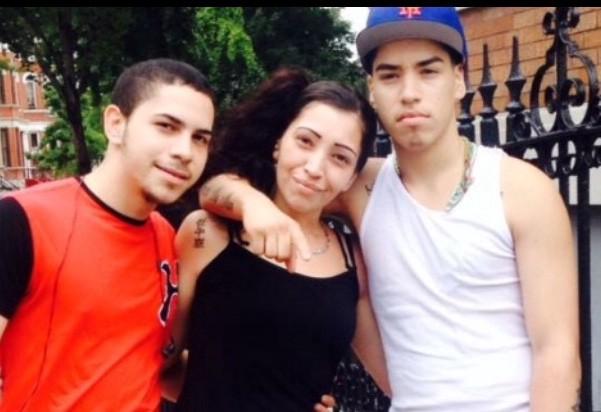
On the evening of January 29, 2018, Caryn Santa knew she only had a few hours to save her son, Robert Collazo. Collazo, 21, had been held on Rikers Island for almost three years, charged with the murder of Jose Velasquez. Around 3:35 a.m. on Easter Sunday in 2015, Velasquez, 19, was fatally shot near the corner of East Burnside and Walton Avenues in the Bronx. On April 9, 2015, Collazo was arrested after a Bronx man named Joenelvy Ferreras identified him as the shooter in a multiple photo identification and an in-person line-up shown to him by police, according to a disclosure form prepared by a prosecutor on the case.
Collazo’s attorney Martin Goldberg claimed, however, that the police’s identification procedures were tainted. Ferreras told the police that the perpetrator was a light-skinned man, but in the police line-up “there were only two light skinned-guys,” said Goldberg. Goldberg also said that Ferreras was likely to pick Collazo because his friend, Jailene Espinal, had already shown him Collazo’s photo while texting about the shooting.
Furthermore, footage of Collazo from a party Espinal threw the night of the murder captured by a camera inside her building did not match the surveillance footage of the shooter taken from a nearby store, according to Goldberg. “At the party, he’s wearing a distinctive teal colored hat and teal shirt,” said Goldberg. “That didn’t look like the shooter.”
Despite the factual issues with the case, Collazo was convicted of second-degree murder when he went to trial in the Bronx in December of 2017.
So on that freezing January evening, Santa assumed that her son was about to be sentenced and sent upstate. Santa, a house cleaner, had scraped together what she could to hire Manuel Gomez, a former NYPD officer turned private investigator, and was accompanying him as he searched for evidence that could prove her son’s innocence. That night, Gomez and Santa tracked down key witnesses Ferreras and Espinal, who alleged in sworn written affidavits that the Bronx district attorney’s office had pressured them to change their stories about what happened the night of the Velasquez murder.
With this new evidence in hand, the Collazo defense team moved to file a “330.30 motion” that could set aside the verdict. Already rocked by recent accusations of rampant sexual activity, alcohol use, and fighting amongst its staff, the Bronx district attorney’s office now faces an allegation that threatens to further erode the public’s faith in its prosecutors: the coercion of witnesses in the pursuit of a conviction.
That January night, Santa and Gomez pulled up to the Bronx building where Ferreras, the sole identifying witness in her son’s case, resided. Santa had heard this was the building where Ferreras lived, but they didn’t know Ferreras’s apartment number or if he was even home.
After about 45 minutes, Gomez walked back to the car where Santa waited, looking happy. “He said, ‘Look, this is it’,” said Santa in an interview with The Appeal, referring to a signed affidavit that Gomez obtained from Ferreras. In the affidavit, Ferreras stated that he was “harassed by” Orville Reynolds, a Bronx assistant district attorney, “to change” his statements in the case against Collazo. Ferreras, who affirmed his claims about the ADA in a recorded video statement, said that he had never seen the shooter’s face and indicated that he had told prosecutors about texts he had sent a friend the night of the murder in which he had said the same thing.
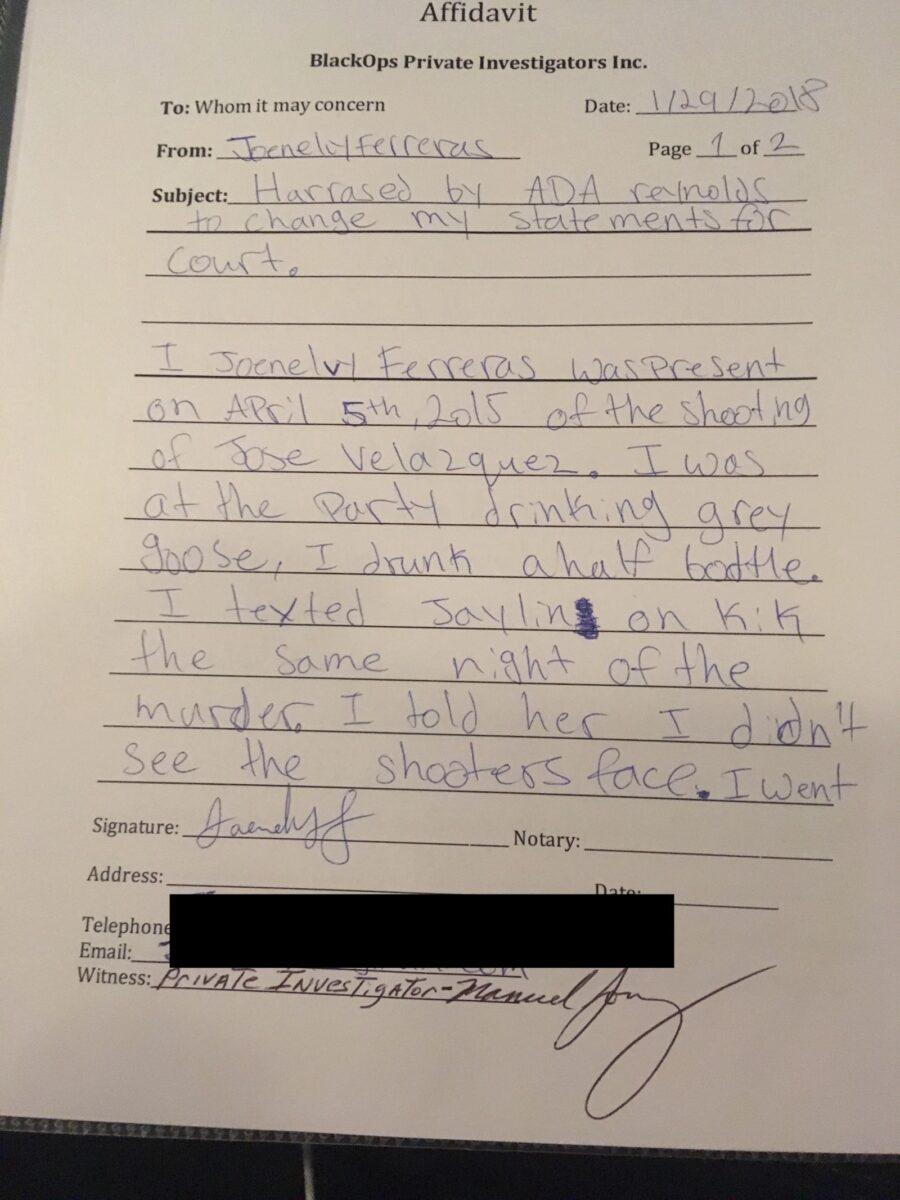
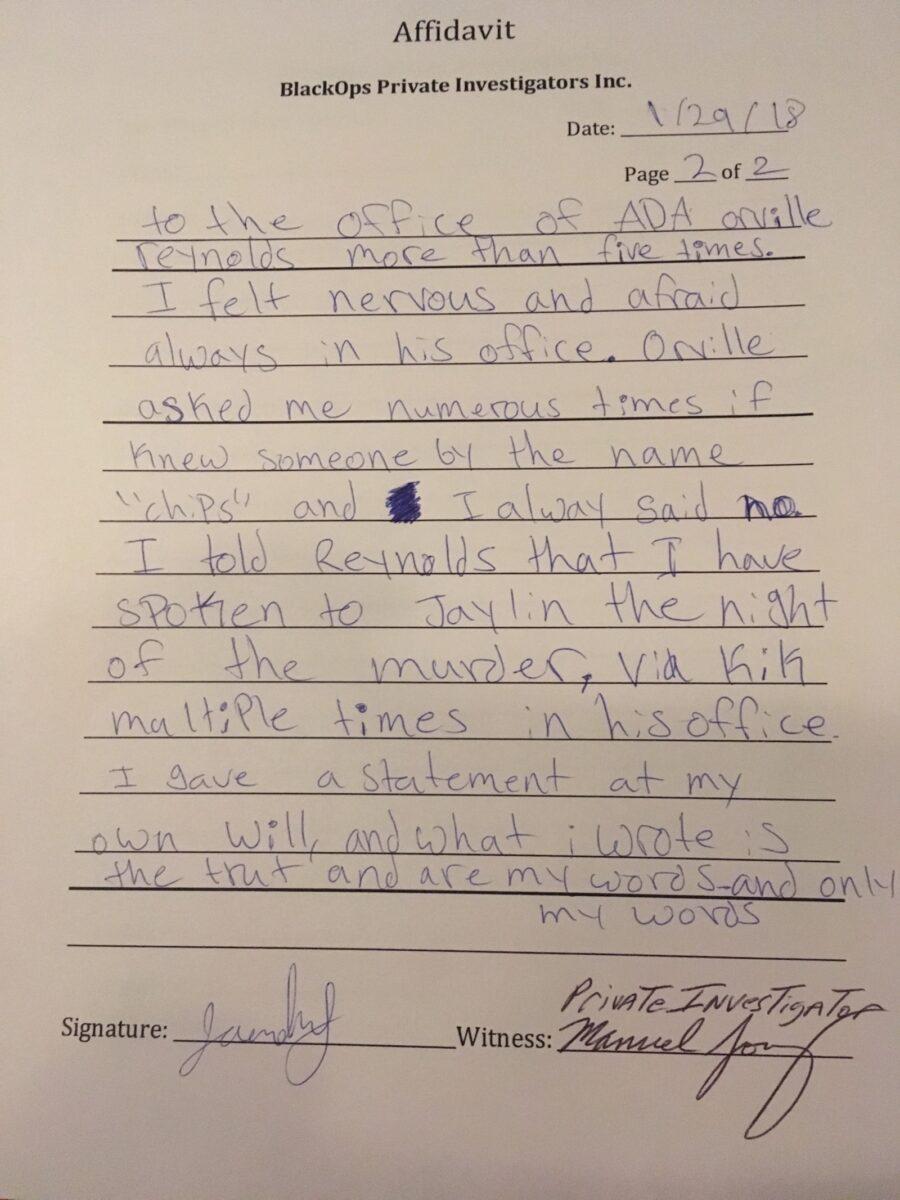
“I asked, ‘Is this going to help?’” Santa remembered. “He was like, ‘Of course, that’s everything.’ I couldn’t believe it.”
The next morning, on January 30, 2018, Judge Lester D. Adler of the Ninth Judicial District Court called for an adjournment “in light of the documentation” that Santa provided to her son’s attorney, according to court minutes reviewed by The Appeal. With the judge’s decision, the murder case against Collazo appeared to be in jeopardy.
It was a moment of real hope for Collazo — but even today his fate remains unclear, largely because Ferreras may have recanted the statement he gave to Gomez. Collazo’s attorney Martin Goldberg is being taken off the case because he may be called as a witness in the motion to set aside its verdict. That motion will be filed by a new defense attorney, who will be assigned to the case on March 12. And in a March 3 phone call with The Appeal, Goldberg, a former prosecutor himself, said that he heard that the state’s sole identifying witness, Ferreras, may have gone back on his recantation in a new statement to Bronx prosecutors.
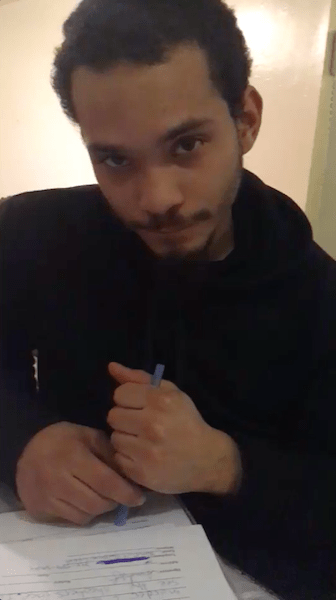
Ferreras himself seemed to corroborate the rumor of his apparent change of heart in a March 4 telephone call with Gomez, the private investigator. When Gomez asked who he spoke with in the district attorney’s office to again change his statement, Ferreras said he spoke with ADA Reynolds. In a brief phone call on March 1 with The Appeal, Ferreras refused to answer questions about his previous allegations that ADA Reynolds had pressured him to implicate Collazo in the Velasquez murder. “I did what I had to do,” said Ferreras, “I told the truth in court … Leave me the fuck alone.”
Collazo insists that he should not have been convicted in a murder based on the testimony of an eyewitness who has changed his story multiple times and that he suspects Ferreras is again being intimidated by the Bronx DA’s office. “Reynolds is probably telling him, ‘I’m going to lock you up, I’m going to charge you.’ He’s probably scaring the kid, he’s a young kid,” said Collazo in a phone call with The Appeal from Rikers Island on March 4. “But he gotta be tough, he’s gotta know, if you know I didn’t do it, how can you go to sleep at night? How can you put away somebody for the rest of their life?”
Though Ferreras appears have recanted the statements he made in the affidavit he gave to Gomez and returned to his original testimony identifying Collazo as the shooter, Collazo’s supporters point to another misconduct allegation against the Bronx district attorney’s office that was uncovered by Gomez the same night he spoke to Ferreras.
In written affidavit from January 29, Jailene Espinal, Ferreras’s friend and the host of the party outside of which the shooting took place, stated that ADA Reynolds “harassed her” by going to her or her boyfriend’s house every “three to two months” and tried to get her “to lie.”
“He wanted me to say Robert Collazo changed all his clothes when I didn’t personality [sic] see him change,” Espinal said in the affidavit. She also said that Ferreras had texted her on the same day of the murder, saying that “he ain’t witness anything he was too drunk to remember…”
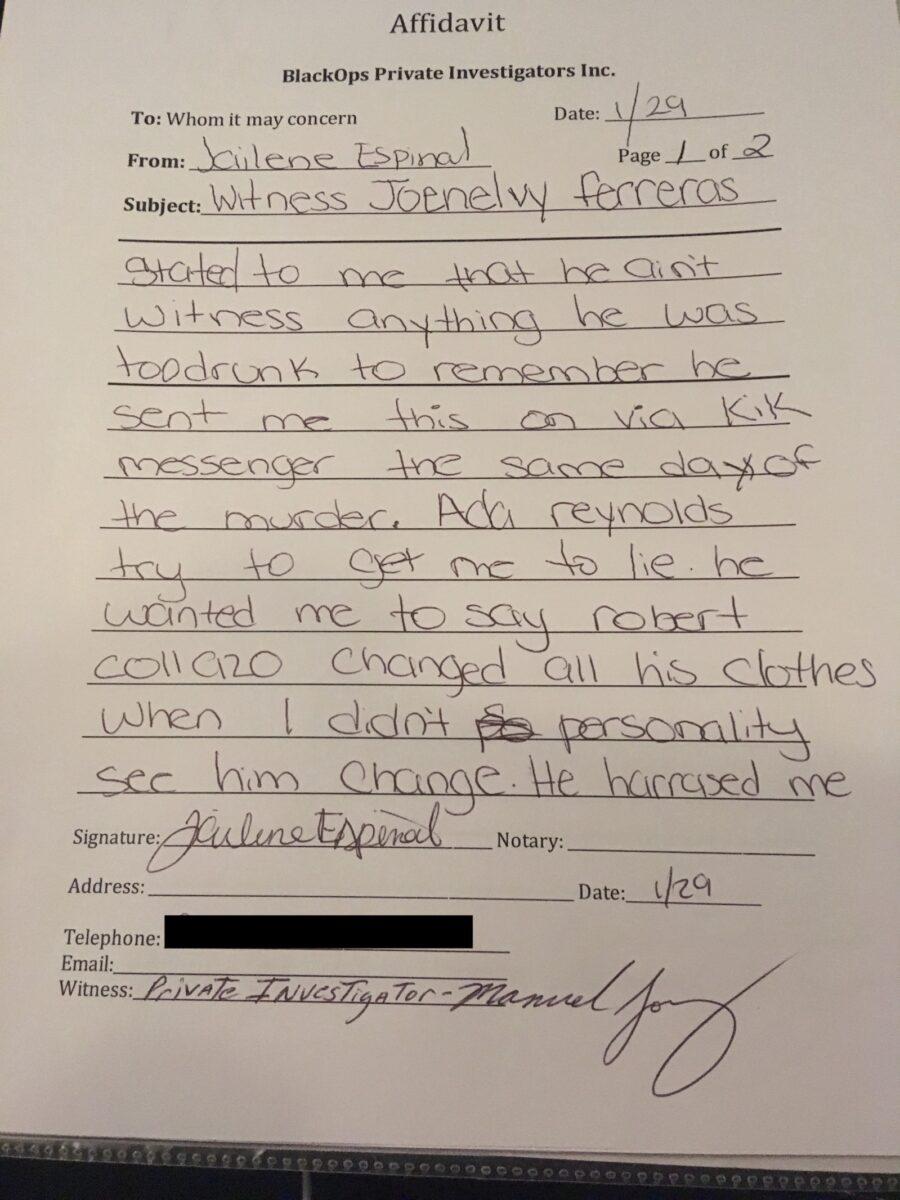
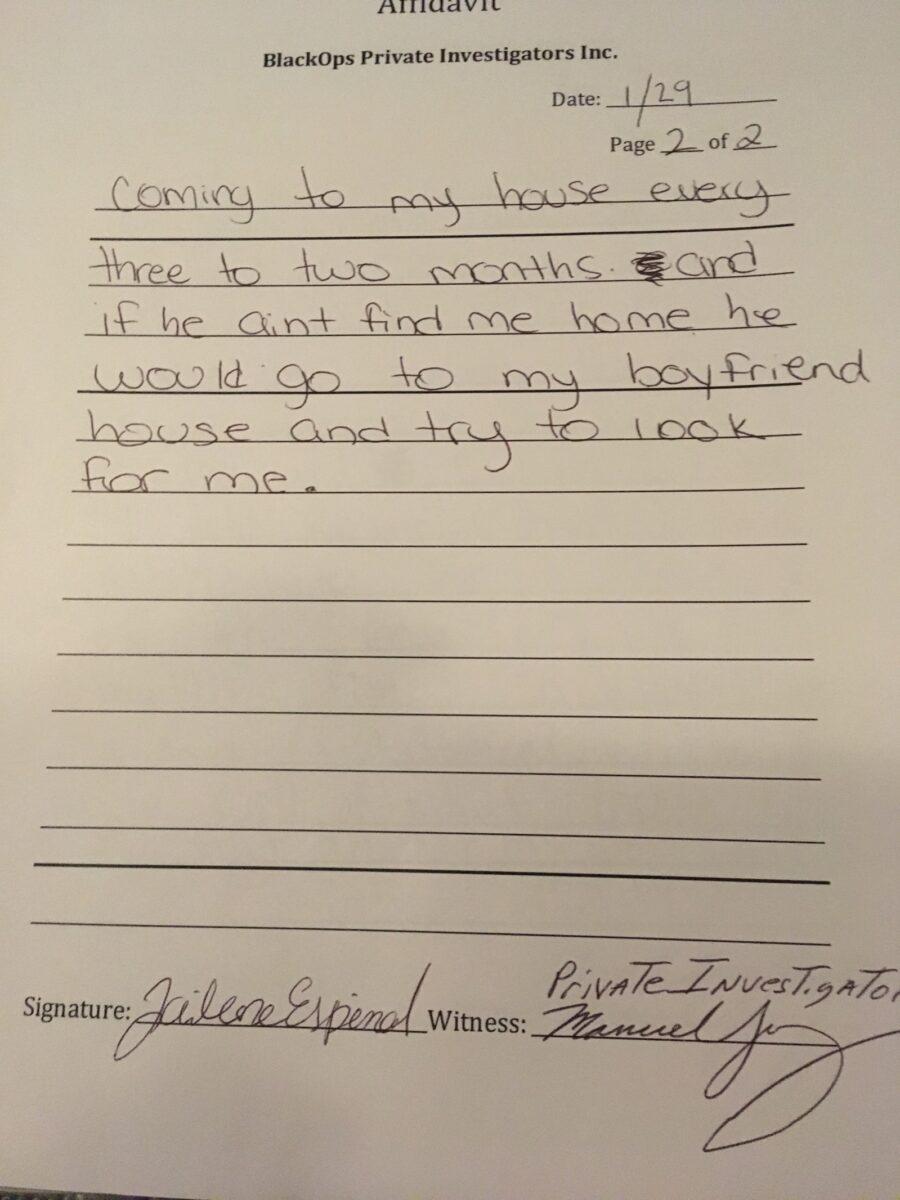
It’s unclear if this new evidence will be enough to set aside Collazo’s conviction.
“It’s a question of what the judge wants to believe,” said Goldberg, Collazo’s former attorney. If Ferreras sticks to the original story he told prosecutors, there may not be sufficient reason to set aside the verdict, said Goldberg. But, he continued, “if he says he was pressured [by Reynolds], the judge would agree with us, and the DA would probably decline to prosecute the case.”
Goldberg cautions that there may not have been misconduct in this case. “Reynolds is a decent, honest guy,” says Goldberg. “He’s got a job to do.” (A separate case, where Gomez, the private investigator, showed police coerced witnesses to sign false statements sparked a federally assisted internal investigation into the Bronx district attorney’s office in September 2017.)
“The bottom line is he’s a liar and his credibility is destroyed,” said Gomez of Ferreras in a phone call with The Appeal. “What case do they have? A guy who recants his recantation?”
Prosecutors from the Bronx district attorney’s office also seemed to voice doubt about Collazo’s guilt even after his 2017 conviction. During a January 10, 2018 sentencing hearing, ADA Reynolds said he had offered Collazo “numerous opportunities … to come and speak with me; multiple times, almost at times begging for him to come and speak with me, because I did not want somebody to be on trial if, in fact, they did not commit a crime.”
Goldberg claims that the purpose of such entreaties from ADA Reynolds was to persuade Collazo to testify against yet another suspect, William Hernandez, whom “numerous people” on the street had indicated may have been the real shooter. “In fact, offers were made to my client to actually come and — he was going to testify against the shooter,” Goldberg said at the January 10 sentencing hearing, referring to Hernandez.
Collazo says he refused to consider any such offers to testify against Hernandez because he did not see the shooter that night. “He wanted me to make up some shit, make a lie up,” said Collazo. “Speak about something I don’t know. He just wanted to place somebody else in my shoes … I’m not doing that.”
A detective’s report, released during the discovery process to Goldberg and reviewed by The Appeal, also referred to a picture of another individual as the murder suspect. Gomez, Collazo’s private investigator, believes the photo is of Hernandez.
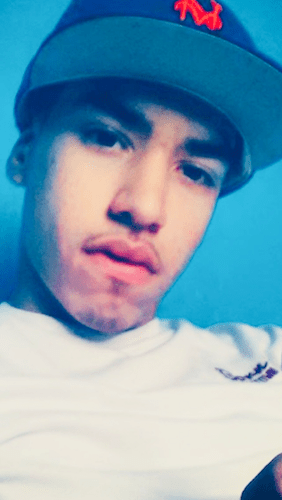
At Collazo’s January 2018 sentencing hearing Goldberg also said ADA Reynolds told him that the Bronx DA’s office had “reason to believe that Mr. Collazo might not have been the shooter,” according to court minutes. Despite these apparent doubts, at the same hearing ADA Reynolds insisted that the judge sentence Collazo that day, saying, “I am asking that Mr. Collazo be sentenced today. I am not here to retry the case.”
Judge Adler did not comply with the state’s request and delayed Collazo’s sentencing. Adler then referenced doubts about the case that appeared to be shared by both sides. “I do not want to sentence anybody for a crime that the attorneys believe, both attorneys — I mean, you know,” the judge said, before calling an off-the-record meeting with the attorneys and granting Collazo a delayed sentencing date.
After a March 12 court date in which a new defense attorney will be assigned to Collazo, upcoming hearings will address the integrity of Ferreras as the sole identifying witness, the motion to set aside the verdict, possible allegations of prosecutorial misconduct, and Collazo’s sentence.
Whether Collazo pulled the trigger that night seems to be irrelevant to ADA Reynolds, Santa claims, referencing a meeting in 2017 with the prosecutor in which he allegedly said her son was prison bound regardless of the case’s outcome. “He said, ‘Let’s keep it official: if he comes home, don’t you think he’s going to get arrested for something else?’,” recalled Santa. “I said, ‘And if he does, then he’ll deal with it. This is a different case.’ ”
The Bronx district attorney’s office declined to comment on issues raised in this article. “We cannot comment on a pending case,” the office wrote in an email.
Before his arrest, Collazo says he never realized how quickly a single prosecutor’s behavior could change his life. “Three years here [on Rikers Island], wasting my life for something I had nothing to do with,” said Collazo in a phone call. “What did I ever do to Reynolds, what did I ever do to the Bronx district attorney’s office? It’s crazy how you could go to a party one day, and the next week you’re locked up.”
The allegations against ADA Reynolds come as a personal injury claim of $15 million against the Bronx district attorney’s office is being brought by crime analyst Crystal Rivera. Rivera alleges that there was a culture of racial bias, on-duty sex, alcohol and even fighting among prosecutors at the DA’s office and that she suffered “mental anguish” after Bronx DA Clark retaliated against her for exposing such misconduct.
Rivera launched her suit after Clark placed her on administrative leave for allegedly violating the DA’s demand that she cut off contact with her boyfriend, NYPD Detective David Terrell, who had been accused of coercing witnesses in a gun and assault case against Pedro Hernandez — the same case, also upended by a Gomez investigation, that launched the federally assisted internal probe into the DA’s Office in September 2017.
Before becoming the Bronx district attorney, Clark promised the creation of a wrongful conviction review unit so that “things like” the Kalief Browder case, would not happen under her watch. Bronx resident Browder was incarcerated for three years on Rikers Island for stealing a backpack, a charge that was later dismissed. A depressed and PTSD-stricken Browder committed suicide in 2015 at the age of 22. Clark was one of several judges who presided over Browder’s case and has been blasted in the press for her promotion of the Bronx assistant district attorney who prosecuted Browder.
“I respect my son to the fullest for this, no matter how many offers they gave, he said he was not guilty,” said Santa, referring to the prosecution’s alleged attempts to get Collazo to testify against Hernandez. “If the person actually committed the crime, then they need to be convicted, but if they didn’t, it’s not all about winning. It’s not about how many times you’ve won so you can be the best ADA.”
